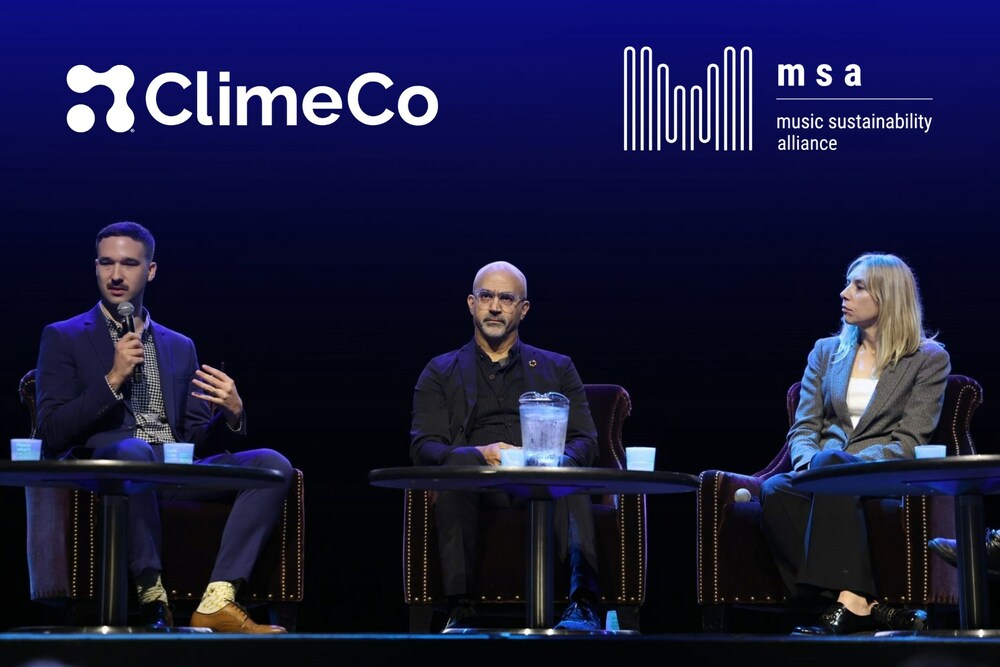ClimeCo, the leading global decarbonization and environmental solutions company, recently partnered with the Music Sustainability Alliance (MSA), the hub for learning, innovation and collaboration for driving sustainable operational change in the live music industry. Together, they are pleased to share the results of their recent study on the state of sustainability in live music presented at MSA’s Music Sustainability Summit. Their research engaged more than 50 influential stakeholders, including tour managers, promoters, record labels, venues, production managers, non-profit organizations, festival operators and others, through in-depth personal interviews conducted in late 2023. The findings shed light on present challenges, successes and areas of opportunity, including drivers, barriers and emerging sustainability focus areas shaping the narrative of the live music industry.
Top-level Findings
Perhaps the most significant key finding is that all groups interviewed recognized the importance of sustainability efforts and indicated that they are actively working to improve in this area. Also, there was substantial overlap among the various survey groups in identifying possible areas of focus, but the options were prioritized differently based on role and functional area.
Key Drivers
Ninety-one percent of groups interviewed indicated that the anchor of sustainability in the live music industry is the influence of artists. Artists play a pivotal role in shaping the vision for their tours and engagement with fans. This influence is further accentuated by the widespread adoption of green riders, prompting venues to become more responsive and accommodating of the expectations set by artists. Promoters also emphasized sustainability as a common pre-requisite for booking acts, especially with artists who are vocal about climate change. Smaller artists may have difficulty asking their partners to improve their sustainability practices since the clout of more prominent figures is undeniably more significant.
Fan engagement and sincere commitment to driving substantial change are important in effectively implementing sustainability improvements. Tours have reported heightened success in engagement when artists and artist communities actively advocate for climate adaptation directly with fans during events. Tour managers highlighted the growing trend for artists to include tabling events and on-site volunteer registration opportunities, fostering deeper connections between fans and their admired artists through shared values. Additionally, eighty-two percent of groups interviewed reported that involving fans in sustainability efforts was critical to ensuring their success. They also noted that fans often expect and actively seek sustainability measures at live events and are eager to participate in impact mitigation both on-site and off-site.
Successes
Ninety-one percent of groups interviewed pointed to successful waste reduction initiatives and/or pilot programs exploring the use of cleaner energy sources. Venues mentioned efforts to increase recycling and composting capabilities. Festival operators highlighted reductions in single-use plastics over the past several years. On the alternative energy front, non-profit organizations and production managers have tested the use of solar energy for live performances and as a diesel generator replacement, while tour managers and logistics partners are exploring the adoption of alternative fuels in transportation and logistics.
Challenges
Navigating the sustainability landscape in the live music industry poses challenges, with key barriers that include prohibitive costs and access to granular data. Seventy-three percent of groups interviewed mentioned the steep cost of implementation as an organizational challenge. Venues noted the difficulty of measuring baseline data for live event footprint calculations, and record labels stressed the need for more industry-wide standardization in measuring greenhouse gas emissions.
Non-profits and several touring managers suggested using sponsors to underwrite the cost of key environmental initiatives and the measurement of their success as a possible solution to mounting cost pressures. That said, concerns about fan and partner reactions to greenwashing remain a consideration in any effort. A widespread lack of clarity around which group should assume primary ownership over environmental matters, including policy decisions, measurement and reporting, has also slowed progress. As the industry grapples with these challenges, a growing consensus across all groups is that the music industry needs to work with outside experts to set accurate goals and key performance indicators to ensure alignment.
Emerging Issues/Opportunities
While the challenges of enhancing overall responsibility and impact reporting are already evident, all stakeholders stressed that the momentum behind these efforts will only grow in popularity, creating significant opportunities for early adopters and innovators. Consultants and managers suggested that the industry expand avenues for attendees to reduce their impact and empower fans interested in contributing to sustainability improvement. Since fan travel is generally the largest source of carbon emissions for tours and festivals, several venues and festivals discussed efforts to create ride-sharing or shuttle programs to lower single-occupant vehicle use for fan travel, creating significant emissions savings and providing sustainable options to fans. Many stakeholder subgroups noted the importance of pre-planning tours to mitigate climate impacts. They also noted the pivotal role of education and awareness in sustaining momentum across the industry and the general public. Several groups also indicated that location-specific policies (venues, cities, etc.) and the political landscape of local communities often impact the success of sustainability efforts.
Garrett Keraga, Senior Manager of Sustainability, Policy and Advisory at ClimeCo, who spearheaded the project, noted, “Given its visibility, platform and passion, the entertainment industry is one of the most important and influential drivers of climate action. This effort shows that while sustainability progress is being made in live music, industry groups need help in navigating the process. ClimeCo has worked with numerous industry players to create sustainability strategies, plan and implement abatement solutions, create measurable impact and communicate progress. We are thrilled to partner with forward-thinking groups like the Music Sustainability Alliance to use the power of music to create a brighter future.”
“Working with ClimeCo to conduct stakeholder engagement interviews shined a light on the depth of work the music industry is engaged in, along with the success stories and challenges it is facing in becoming more sustainable,” noted MSA Director Eleanor Anderson. “This research is a step towards understanding where we are in our sustainability journey, the challenges we need to solve and the opportunities for action,” added MSA President Amy Morrison.







